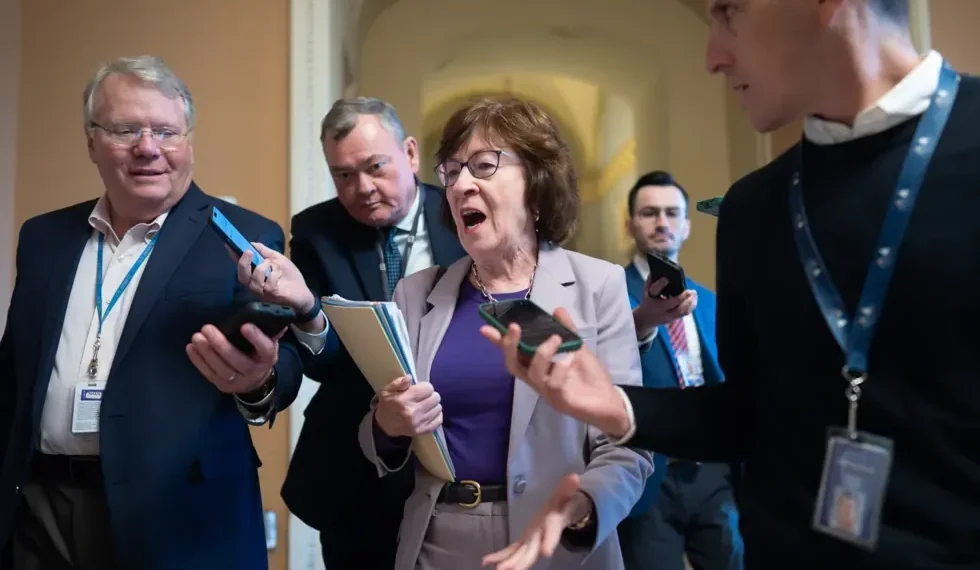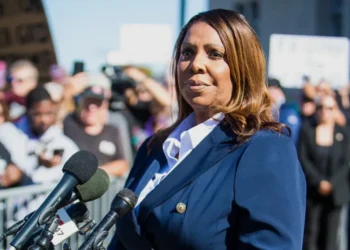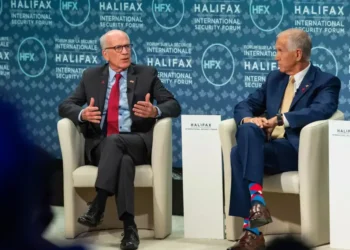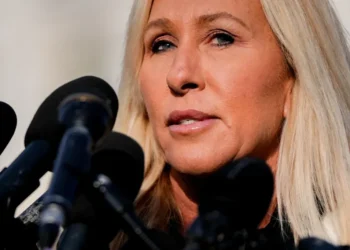The U.S. Senate is moving closer to approving a bipartisan legislative package aimed at ending the nation’s longest government shutdown, which has stretched into its 41st day and disrupted critical public services. The measure, which gained key Democratic support late Sunday, would fund most federal operations and guarantee back pay for hundreds of thousands of furloughed workers. However, it leaves unresolved a major dispute over health care subsidies that Democrats sought to protect.
Funding Deal Gains Bipartisan Support
The legislation passed a procedural vote in the Senate on Sunday by a 60–40 margin, with eight Democrats joining Republicans to advance the bill. The package provides short-term funding to reopen government agencies through January 30, while also including full-year appropriations for agricultural programs, military construction, and veterans’ affairs through September 2026.
Republican Senator Susan Collins of Maine, who chairs the Senate Appropriations Committee, described the vote as a long-overdue breakthrough. “This shutdown has gone on far too long,” Collins said, noting that securing yearlong appropriations for veterans’ programs ahead of Veterans Day was a significant achievement.
The bill ensures that states will be reimbursed for expenses incurred to keep the Supplemental Nutrition Assistance Program (SNAP) and the Women, Infants and Children (WIC) nutrition programs operational during the shutdown.
Health Care Subsidies Deferred for Later Vote
A central point of contention remains the expiration of federal health care subsidies that help millions of Americans afford insurance through the Affordable Care Act (ACA). Democrats had pushed to include an immediate extension of these subsidies, arguing that rising premiums would place additional strain on families.
While the current deal promises a Senate vote on the issue in December, the delay has frustrated several Democratic lawmakers. “The American people want us to stand and fight for health care,” said Senator Elizabeth Warren of Massachusetts, who voted against the bill.
Senate Democratic Leader Chuck Schumer also opposed the measure, saying it failed to address the subsidies that millions depend on. Despite this opposition, the bill is expected to move forward, reflecting broad bipartisan desire to end the shutdown’s economic and social disruptions.
Relief for Federal Workers
The package offers long-awaited relief to federal employees, many of whom have gone weeks without pay. It reinstates workers who were furloughed or faced layoff notices and guarantees retroactive pay once the government reopens.
The Trump administration had previously signaled that back pay was not guaranteed, creating uncertainty for federal staff. The new measure eliminates that ambiguity, reaffirming the traditional commitment to compensate workers for missed wages during shutdowns.
Ongoing Political Challenges in Congress
Although Sunday’s procedural vote marked progress, several hurdles remain before the legislation can reach President Donald Trump’s desk. Lawmakers are attempting to fast-track the process to avoid another week of delays.
Some Republican senators have raised objections to specific provisions. Senator Rand Paul of Kentucky opposed the measure due to concerns about a hemp-related clause, while a small group of conservative Republicans temporarily delayed proceedings as they sought to advance their own policy priorities.
Democrats in both chambers remain divided over how to handle the bill’s omission of health care funding. In the House of Representatives, Democratic Leader Hakeem Jeffries of New York criticized the proposal, signaling that his caucus may refuse to support it.
“We will not support spending legislation advanced by Senate Republicans that fails to extend the Affordable Care Act tax credits,” Jeffries said. “Donald Trump and the Republican Party own the toxic mess they have created.”
Next Steps Toward Reopening the Government
If the Senate passes the package, the measure will move to the House, where members are being recalled from recess to vote. Speaker Mike Johnson of Louisiana, who holds a narrow Republican majority, may need nearly all GOP members to approve the bill given Democratic resistance.
President Trump, returning to the White House on Sunday evening after attending a football game, signaled optimism about a resolution. “It looks like we’re getting close to the shutdown ending,” he told reporters.
Should both chambers approve the deal, federal agencies could resume operations within days, ending more than a month of stalled services, delayed paychecks, and mounting economic costs. The agreement would mark a temporary truce in Washington’s broader budget battles but leaves unresolved the deeper partisan divisions over health care, spending priorities, and fiscal governance.
This article was rewritten by JournosNews.com based on verified reporting from trusted sources. The content has been independently reviewed, fact-checked, and edited for accuracy, neutrality, tone, and global readability in accordance with Google News and AdSense standards.
All opinions, quotes, or statements from contributors, experts, or sourced organizations do not necessarily reflect the views of JournosNews.com. JournosNews.com maintains full editorial independence from any external funders, sponsors, or organizations.
Stay informed with JournosNews.com — your trusted source for verified global reporting and in-depth analysis. Follow us on Google News, BlueSky, and X for real-time updates.














